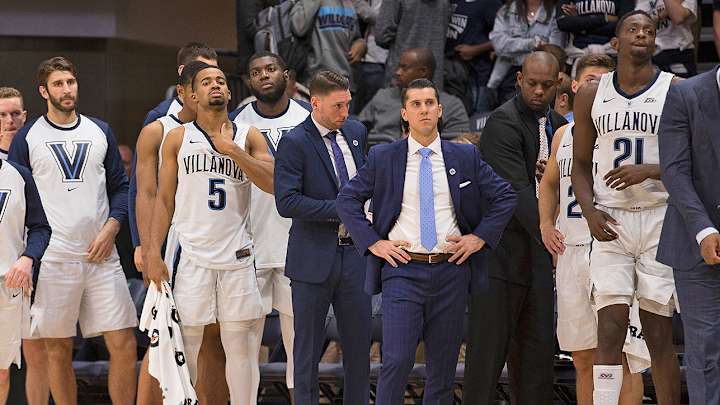Michigan's Clinical Takedown of Villanova Shows Rebuilt Wildcats Have a Long Ways to Go

VILLANOVA, Pa. — By the end of the night, the script had fully flipped, the vestiges of a championship rendered irrelevant in what was only a rematch in the nominal sense. “This was a November win,” head coach John Beilein cautioned. His Michigan team had just delivered a 73–46 win, a measured bruising of Villanova that doubled as April’s championship game redux. The recasting of the matchup suited them, the Wolverines playing an ugly foil to avenge a 17-point defeat while their opponents christened a revamped Finneran Pavilion with little style to speak of. Beilein is right—it’s too soon to call anything—but it was evident what changed in seven months’ time.
Michigan and Villanova have earned reputations as two of the most consistent programs in college hoops, developing talent year-to-year, funneling talent to the NBA and finding ways to extract results when the games matter most. That label does not guarantee a level playing field. They met each at drastically different places in the development cycle: the hosts returned just three rotation players, the other side rolled out five, and preseason rankings meant little. An 8–2 Michigan lead became 26–10, which spiraled to 44–17 at the half and never got much better. Villanova’s loss brought a lackluster end to the program’s long-standing, D-I best 106 game streak of avoiding double-digit defeats.
RAGATZ: Indiana's Support Around Romeo Langford Has It Poised for Big Ten Contention
“We’ve got too many pieces. We’re not as organized as we want to be,” Jay Wright admitted, taking the blame for his players, pointing to the experience and discipline of their opponent and noting a need to trim his rotation, perhaps sooner than later. Villanova’s chemistry progressions will eventually have to mask those holes in their personnel, which will shift as Wright makes sense of his best combinations. But the potentially damning problem with this new Villanova group may not be that there are too many options, but the obvious absence of an elite individual shot-creator to loosen up defenses.
In the Wildcats’ first matchup with a sufficiently athletic opponent, Michigan’s perimeter gameplan laid that issue bare, cuffing pick after pick, wrecking the spacing and holding pass-happy ‘Nova to seven team assists on just 14 made field goals. The scheme proved a nightmare. “Against teams like that, you’ve gotta play together and know where everyone’s gonna be,” Wright said. The lack of scorers is an issue typically remedied with fluid cutting, screening and side-to-side ball movement, but the offense dragged and fizzled, perhaps as a direct result of ’Nova’s inexperience. As possessions stuttered, veterans Eric Paschall (who shot 3 of 14 from the floor) and Phil Booth (2 for 8) forced shots and were bottled up in unbecoming isolation situations. They didn’t get much help.
“Young guys change through the year,” Wright noted, but they do not often so so on the fly. “When you’re trying to pull pieces in and out and they’re all young pieces, rarely does that work.” In addition to freshman wing Saadiq Bey, Wright hesitantly rotated in more-touted newcomers Jahvon Quinerly and Cole Swider as the game broke bad, receiving little in the way of results. Nothing unlocked Paschall’s inside-out game or generated cleaner looks. Collin Gillespie, who came off the bench for last year’s team and has been the early-season starter at point guard, was badly overmatched. Quinerly did little to suggest he’s ready to win that job, which looks like another point of concern. Wright tried three-guard lineups and pairing Paschall with Swider for added versatility, but Michigan’s lead stretched to as many as 32 points early in the second half, and it never felt much closer.
GREENE: Thanksgiving Week Tournaments to Be First Test for Many Contenders
“This could be John’s best defensive team ever,” Wright said after the game. “They weren’t complicated…it doesn’t matter what you have, it matters how you execute with what you have.” Coach-speak aside, on some level it did and will continue to matter what Michigan has. Zavier Simpson (five steals) and Charles Matthews (19 points) earned seats at the postgame presser, but the trio of defensive-minded hoss Jon Teske, thickly cut floor-spacer Isaiah Livers and freshman firebrand Ignas Brazdeikis are part of what make the Wolverines so scary. They were in sync and aggressive. “If we can be that versatile…most teams, you switch a ball screen, they’re not going to get more complicated [to defend] afterwards,” Beilein explained.
With experienced guards, athletic perimeter defenders, and an ability to dictate opposing personnel with alternating smaller and bigger pairings up front, it’s possible the Wolverines lost Moe Wagner and still improved in spite of it. Brazdeikis, whom Beilein labeled as a ‘hunter,’ was something of a revelation, scoring 18 and pulling his weight in the spotlight. It was hard to quantify which end of the blowout was more surprising, but Michigan’s poise and identity inflicted the damage. After last season’s bitter end, this was something of an exorcism—it was clear how badly they needed a result like this.
As for the Wildcats, the easy answer is to point to the program’s foundation and brush this off. Still, recall that this is a wholly different group, originally meant to feature Donte DiVincenzo as a playmaker and pair Omari Spellman with Paschall up front. This team should still have the experience and toughness to win a defensive battle, but seemed to lack the offensive quality to flip a massive deficit. Few title hangovers are ever easy, but for now, Villanova is slated for more of a reboot than a rebirth.
